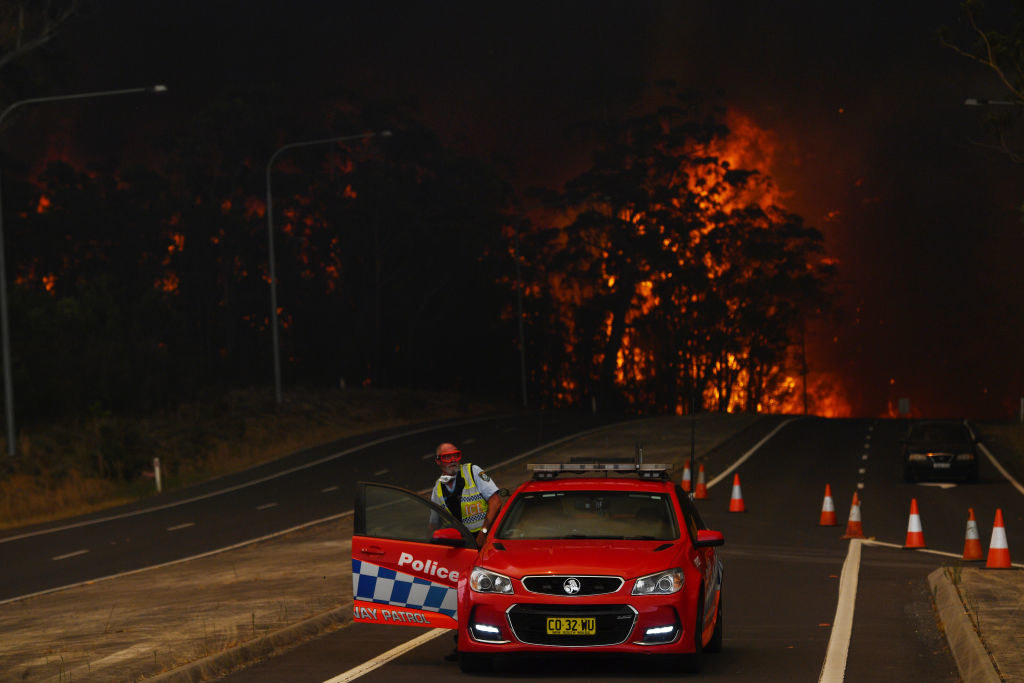A zoo was saved. Homes and businesses were destroyed. At least two people died, with more confirmed fatalities likely.
And an image of a child on a boat — smoke mask over mouth, hand on engine, under a bright red smoky sky — was shared by thousands of people as a marker of the severity of the bushfire disaster that has been slowly unfolding for weeks.
This was the last day of the decade on Australia's east coast.
According to ABC Gippsland, which shared the striking image of the child on Facebook, the photo was taken by a mother on a boat with her two sons, trying to stay safe from a blaze threatening Mallacoota, Victoria.
On Tuesday morning in the town in Australia's southeast, thousands of people fled to the beach for refuge under a sky so dark with smoke that it looked like nighttime at 9am.
Three hundred kilometres north, staff at Mogo Wildlife Park were miraculously able to save every single animal from a different fire that swept through the area.
"Right now in my house there is animals of all description in all the different rooms," zoo director Chad Staples told the ABC. "Due to the amazing staff here, and a well-executed plan, no one is hurt. Not a single animal lost.
"What we did with the dangerous animals — lions, tigers, orangutans — is we encouraged them to the night den, kept them calm, like nothing was happening, and we were able to protect them at that site."
Staff at Mogo Zoo south of Batemans Bay have been working desperately to control fires on the property, describing it as a “war zone”. They have been able to protect all zoo animals #nswfires 📸: Chad Staples
He said the only animals that showed signs of stress were the giraffes and zebra.
"It was as black as midnight with tinges of red. It was like we were fighting fires in the darkness," he said. "We have still a lot of spot fires, but it felt like Armageddon a few hours ago."
The zoo was a rare piece of good news in an otherwise terrible day. Other parts of Mogo — a small, character-filled arty town — did not fare so well, and buildings were lost.
A father and son died defending their home in Cobargo, where fires also destroyed buildings along the main street. A 28-year-old volunteer firefighter, Samuel McPaul, died Monday when "what could only be described as a fire tornado" flipped the fire truck he was riding in.
Another person remains missing in New South Wales, and four are missing in Victoria.

Although Tuesday's devastation was most severe in New South Wales and Victoria, fires have also been burning in South Australia (where two people have died), Queensland, Tasmania and Western Australia in recent weeks.
Summer in Australia is always marked by bushfires, but this season started earlier and has seen larger and more ferocious fires, than years past.
Some fires started to burn as early as September, and catastrophic fire warnings were issued for blazes along the east coast in mid-November.
Since then, fires have intermittently closed down major highways, claimed several lives, and made smoke haze a new normal in numerous cities and towns including Sydney, which is home to 5.2 million people.
Political fights have broken out alongside the smoke and heat: the first and most significant about climate change.
Prime minister Scott Morrison — who infamously brought a lump of coal into parliament in 2017 during a heat wave, telling Australians they shouldn't be afraid — has vowed not to change the government's climate policies. Australia recently came under criticism at the UN climate talks for its plan to use carryover credits to meet emissions targets.
Earlier this month, former fire commissioner Greg Mullins said "the driving force" behind the fires was climate change and criticised the "leadership vacuum".
"We have no moral leadership as we saw in Madrid. The bushfires weren’t even mentioned. Other countries were aghast," he said.
Maybe these fires will be Australia’s Sandy Hook/Parkland moment. We urge the government to “Do Something!” and if they don’t create a meaningful climate policy after this epic, destructive summer - they probably never will.
The second has been about the ongoing viability of Australia's firefighting forces, which rely on huge numbers of volunteers to fight fires in regional areas, and if the system will have to drastically change in the years ahead.
Sydney's famous New Year's Eve fireworks are still slated to go ahead to bring in 2020. But for many Australians, the past six weeks have replaced the promise of a new decade with an uneasiness around what it might bring.
Earlier on Tuesday, RFS commissioner Shane Fitzsimmons was asked if this was the worst bushfire season on record in Australia. "Yes, absolutely," he answered.

